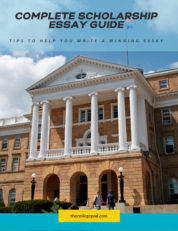With college prices well outside the reach for most families, finding “free money” is a must. Scholarships offer you the opportunity to do just that. If you have applied to dozens of private scholarships and never heard a peep from them, it might just be your essay. Yes, your scholarship essay might be sabotaging your chances of winning a scholarship.
There are millions of dollars of private scholarships (outside of what colleges offer) available, but the competition is fierce. Most of these scholarships have some specific criteria you must meet – for e.g., a specific talent (music), minimum GPA, ethnicity or geographic area. However, even after you meet all these criteria there is still no guarantee you will make the final cut. A well-written, compelling scholarship essay could help distinguish you from other applicants.
Here are some ways your scholarship essay might be failing you:
1. TYPOS & GRAMMATICAL ERRORS
You would be amazed at how many students submit essays with glaring typos and grammatical errors. I read a submitted scholarship essay, not so long ago, where the student ignored basic capitalization rules. He failed to capitalize the first word of every sentence. While this might be cool for text messages among friends, in an essay, not so much.
When applying for scholarships, you should give yourself enough time to read, re-read and edit your essay. Asking a trusted adult to proofread your essay could offer invaluable feedback. When you work with a document long enough, it’s easy to miss errors.
2. YOUR ESSAY IS UNINSPIRING
Yes, your scholarship essay might be “uninspiring”; in other words boring. Using sensory words, descriptive words and examples can bring your writing to life and allow your reader to connect with you. Highly sought after scholarships could easily get thousands of applicants, so you have to find a way to convey your unique perspective on any given topic to resonate with the reader. Your ability to transport the reader into your world or experience in a meaningful way could translate into you winning a scholarship.
Paint the scene and use words that will evoke an emotion in the reader. Scholarship readers, like college application readers, are looking for students who stand out. For example, if you are writing about a challenge of a season-ending injury, don’t just say “I was very nervous while waiting for the doctor to return with the X-ray results.” Instead, paint a picture: “As the doctor walked slowly into my room waving the X-Ray results in his hands, my heart sank. He was no longer smiling.”
Take your reader on a journey to gain connection. Scholarship readers (like admission readers) are humans. If they are moved by your essay, they are more likely to go to bat for you if you make it to the final round.
3. YOU ARE REPEATING YOUR RESUME
The scholarship essay is not a place to repeat the content in your resume. It is a place to showcase your personality and allow the essay reader to learn more about you the applicant. If your essay prompt is focused on your career goals, it might be appropriate to show how an extracurricular activity connected you to your future career. The applications have such limited space that it is a shame to repeat information that can be found elsewhere. Plus, the reader will quickly tune you out and give your essay a low score.
4. IT LACKS A GOOD HOOK
Like any good story, your essay must make the reader eager to read the rest of your essay. A good hook can take many forms, including a quotation or some other surprising details. However, its main purpose is to grab the reader’s attention.
If the person reading your scholarship essay is not really interested in what you have to say, then that could spell trouble. Just remember the hook should be relevant to your topic. Now, truth be told, I’ve read essays that offered a great hook but lacked any substance beyond that. The body of the essay should be equally interesting.
The reader should be able to see you as someone the organization is proud to support. Does your essay paint you as a leader, tenacious, creative, collaborative, or interesting person? Most scholarship organizations want to know that they are investing their money in someone who has endearing qualities and who will represent them well.
5. YOUR ESSAY IS TOO CLICHÉ
Writing about an overseas mission’s trip or about feeding the homeless is quite overdone. Many students write about how participating in an overseas mission helped them discover how fortunate they were. Yes, these trips can be a life-changing experience, but it’s up to you to tell that story in a unique way.
If you want to stand out, try adding a different twist to your story. For example, focusing on someone you met in the airport on your way to the mission trip that changed your perspective on a particular issue. Or, talk about the fact that it was your first overseas trip and it taught you how to get out of your comfort zone. If you have been an introvert, for example, living with people 24x7 during the mission trip would definitely put you outside of your comfort zone too.
6. YOU FORGOT ABOUT THE PROMPT
It is important to respond to the essay prompt being asked and find a way to incorporate your personal story. Some students reuse essays from their college application or other scholarship programs without bothering to customize it. For very competitive scholarships, and even those that aren’t as competitive, that will not cut it.
Scholarship prompts can ask about social issues, current events, career goals or just about anything. You should remember that no matter what is being asked, you have to find a way to address the prompt and tell a personal story. For example, if the prompt is “What is the single most important problem we are facing in the US” don’t try to submit an essay about “Someone You Admire”.
>>RELATED POST: WHERE TO FIND "FREE" MONEY AND GRANTS
7. YOUR TONE
The best scholarship essays are those that have a conversational tone and reveal some vulnerability within the writer. It’s almost like writing an autobiography, but not of your entire life, just an event or two. As you write your essay, try to stay away from using big words where you are more likely to come over stodgy and inauthentic.
Although your essay should come over as conversational, you must resist the urge to become too slangy and overshare. Stay away from words like “coulda” unless you use it wisely to convey a conversation or make a point.
You know how your mom always tells you to watch your tone. Well, with a scholarship essay, you have to watch your writing tone. You don’t want to come over as too casual, negative or cynical. Consider using a similar tone you might use when speaking to a favorite teacher or your mom. Write in a way that conveys confidence without being flippant. Check out these winning scholarship essays.
WRAP UP
Writing a great essay (or personal statement) requires good structure, some level of self-reflection and a great deal of planning and time. If you start out using the freewriting technique, give yourself permission to rewrite. No matter what topic you select, find a way to show your unique perspective, stay away from clichés and hook the reader from the get go. By doing this, you are more likely to convey your personality and convince the reader you are worthy of those highly craved after scholarship dollars.



